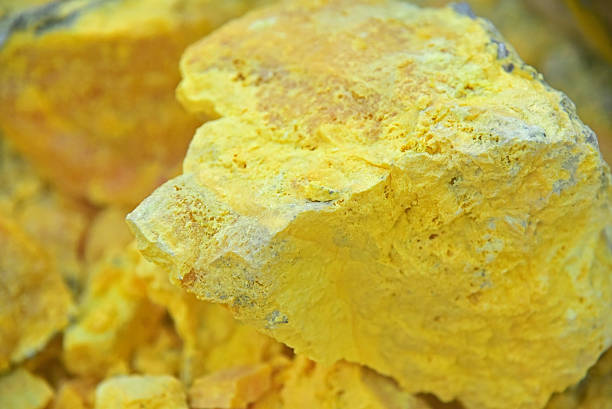
Sulfur Compounds: Applications, Properties and Benefits in Industry and Agriculture
Sulfur Compounds: Applications, Properties and Benefits in Industry and Agriculture

Sulfur compounds - also known as Sulfur - are one of the important chemical elements, widely used in many fields such as industrial production, agriculture, medicine, and many other industries. The following article will provide you with an overview of Sulfur compounds, from chemical properties, diverse applications to safety precautions when using.
1. General Introduction to Sulfur Compounds
Sulfur is a non-metallic element, with the symbol S and atomic number 16, known for thousands of years with its characteristic yellow color. Sulfur compounds exist not only in pure form but also in many different complex forms when combined with other elements, forming useful compounds for production such as sulfur dioxide, sulfuric acid or sulfur-containing fungicides.
In the modern economy, Sulfur is considered the "king of chemical compounds" due to its ability to create key products in production and processing, while contributing to crop protection and safe agricultural production. This article will analyze in depth the properties, applications, as well as the benefits and challenges associated with the use of Sulfur compounds.
2. Properties and Chemical Composition of Sulfur
2.1. Physical and Chemical Properties
- Shape and color: Sulfur in its pure form is usually a solid, characteristic yellow in color with fine crystals.
- Solubility: Sulfur has very low solubility in water but can dissolve in some organic solvents such as carbon disulfide.
- Allotropes: Sulfur exists in many different isomeric forms; the rhombic and monoclinic forms are the most common.
- Stability: Sulfur is relatively stable under room conditions, however, when exposed to moist air, it can oxidize to sulfur dioxide – an irritant gas.
2.2. Common Sulfur Compounds
Sulfur is an important component of many valuable compounds:
- Sulfuric Acid: A product of sulfur oxidation, one of the most widely used industrial acids.
- Sulfur Dioxide (SO₂): Used in the food industry as a preservative and antibacterial agent.
- Sulfur-containing fungicides: Widely used in agriculture to control fungal diseases.
3. Applications of Sulfur Compounds in Various Fields

3.1. Industrial Applications
- Production of Sulfuric Acid:
Sulfuric acid is produced from sulfur through the Contact process. It is one of the important industrial acids, used in fertilizer production, oil processing, water treatment and many other industries.
- Oxidation and Detergent:
Sulfur dioxide is used as a reducing and oxidizing agent in the processing and surface treatment of metals, as well as in the paper industry. - Vulcanization (Rubber Making):
Some sulfur compounds are used in the vulcanization of rubber, which improves the durability, elasticity and life of rubber products.
3.2. Agricultural Applications
- Fungicides and Pest Control:
Sulfur compounds are the main ingredients in many fungicides that are widely used to protect plants from fungal diseases. They help prevent the spread of spores and protect the leaf surface of plants. - Preservation of Agricultural Products:
Sulfur is used as a natural preservative for fruits and vegetables, helping to prevent oxidation, slow down aging and increase storage time. - Fertilization and Soil Improvement:
Some forms of sulfur compounds can be used as supplemental fertilizers, helping to improve soil fertility and increase the ability of plants to absorb nutrients.
3.3. Medical and Consumer Applications
- Skin Care Products:
Sulfur compounds are used in the manufacture of skin care products, especially in the treatment of acne and other skin problems due to their antibacterial and exfoliating properties. - Food Preservatives:
Sulfur dioxide – a product of sulfur – is used as a preservative in the food industry, helping to prevent the growth of bacteria and mold in dried fruits, wine, and other processed products.
4. Advantages and Challenges of Using Sulfur Compounds
4.1. Advantages
- Wide Range of Applications:
Sulfur and its compounds have a wide range of applications from industrial production to agriculture, medicine and skin care. - Reasonable Cost:
Compared to some other elements, sulfur is readily available and has low production costs, helping businesses reduce production costs. - Fast and Effective Action:
Especially in agriculture, sulfur-containing products often have the effect of protecting and controlling fungal diseases quickly, helping to improve productivity and quality of agricultural products. - Safety When Used Properly:
When following the correct dosage and safety procedures, sulfur and its compounds will not harm humans and the environment.
4.2. Challenges and Notes
- Environmental Impact:
Excessive or improper use can pollute soil and water, affecting biodiversity. Therefore, strict regulations on dosage are required. - Health Safety:
Direct contact with sulfur in powder or solution form can cause irritation to the skin, eyes and respiratory system. Wearing personal protective equipment is necessary when working with these products. - Decomposition and Residue:
Some sulfur compounds may decompose slowly or create by-products with negative effects if not handled properly after use.
5. Instructions for Use and Safety Measures
 s
s
5.1. Usage Procedure
- Read the Product Label Carefully:
Before use, users need to clearly understand the ingredients, dosage and instructions for use of products containing sulfur. - Use Protective Equipment:
When working with sulfur powder or solution, be sure to wear gloves, masks, goggles and protective clothing to avoid direct contact. - Follow Safety Procedures:
Spray or apply sulfur-containing products at appropriate times (usually early morning or late afternoon) and ensure that the prescribed dosage is not exceeded.
5.2. Environmental Protection Measures
- Monitoring Use:
Theo dõi, kiểm tra định kỳ nồng độ lưu huỳnh và các sản phẩm phụ trong đất, nước và nông sản để đảm bảo không vượt ngưỡng cho phép. - Waste Disposal:
Wastes from the production and use of sulfur must be properly disposed of to avoid entering water sources and the surrounding environment. - Reasonable Use:
Combine with biological methods and organic farming to minimize chemical abuse and protect natural ecosystems.
6. Conclusion
Sulfur compounds play an important role in many fields, from industrial production to agricultural and medical applications. With diverse properties, high efficiency and reasonable cost, sulfur has been helping businesses improve product quality and increase production productivity. However, to maximize the benefits of sulfur, it is extremely necessary to comply with the instructions for use, safety standards and environmental protection measures.
By combining science and technology with modern safety solutions, businesses can effectively apply sulfur, contributing to the sustainable development of the economy and protecting public health. We hope that this article will provide sufficient information and necessary knowledge about Sulfur compounds so that readers can better understand the applications, benefits as well as important notes when using this product.
Bình luận
Những bình luận mới nhất



